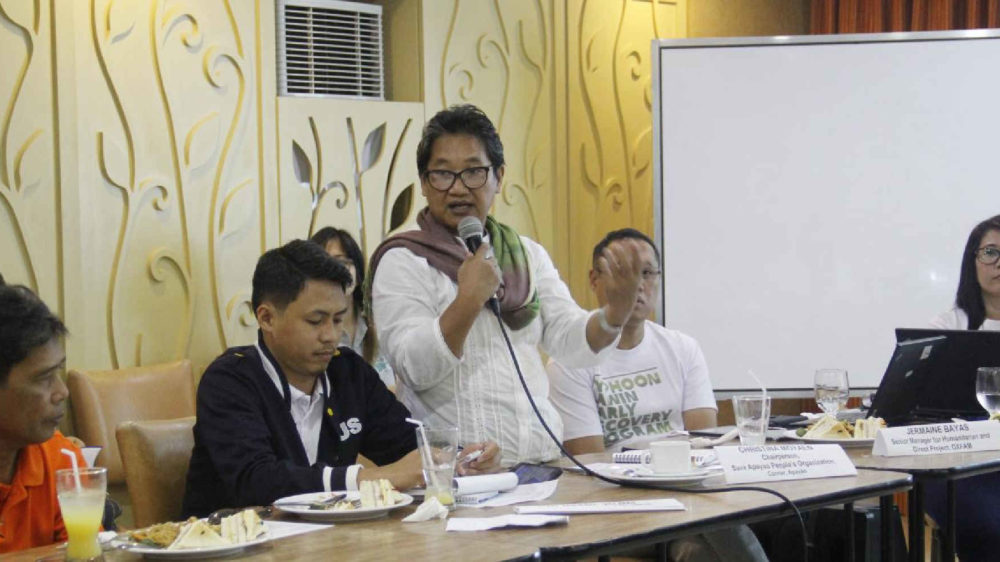Press Release
November 8, 2023
Humanitarian and development organization Oxfam Pilipinas urges local governments to shift from reactive spending to a proactive approach by utilizing local calamity funds, also known as the Local Disaster Risk Reduction and Management Funds (LDRRMF) effectively.
The call came as the country commemorates the 10th year commemoration of Super Typhoon Yolanda (Haiyan), which affected more than 14 million people across 46 provinces in 2013.
A new study entitled “Local Disaster Risk Reduction and Management Fund Utilization Patterns and Opportunities for Improvement” published by Oxfam Pilipinas revealed that local government units (LGUs) tend to spend their 30 percent quick response funds (QRF) in response to actual disasters but are less likely to spend a significant portion of the 70 percent disaster preparedness and mitigation fund.
The report cited the annual audit reports of the Commission on Audit, which pointed out a chain of delays from plan submission to liquidation of funds, resulting in the annual accumulation of unspent funds. It added that this bureaucratic inefficiency means that a substantial portion of funds that could have been spent on enhancing community disaster preparedness remains unspent, resulting in fewer investments to address the disproportional impacts of disasters on vulnerable groups.
“We cannot afford another Haiyan devastating people’s lives. We learned the hard way that the best way to reduce the impacts of a climate crisis is by preparing early for an imminent disaster,” Oxfam Pilipinas Executive Director Erika Geronimo said.
It will be better if local governments proactively utilize their 70% mitigation/preparedness funds that do not require a declaration of State of Calamity instead of merely expending their 30% QRF when disaster strikes.
The study also showed that although local government units respond to the general welfare needs of their constituents, there is a significant gap between the implementation of disaster risk reduction and management programs and the expressed needs of community members.
The report also recommended shifting support for anticipatory actions, including the disbursement of preemptive cash assistance and asset protection through crop and asset insurance before any hazard strikes, enabling communities to prepare better and support the needs of their families. The innovation uses smart data for the community’s early warning system, which triggers the release of anticipatory cash assistance.
The study emphasized how anticipatory action has reduced vulnerabilities and strengthened the capacity of communities to manage emergencies and protect their assets.
“We must listen to the voices of communities and co-create solutions to reduce risks and impacts of disasters before they even happen. We should ensure that our humanitarian response helps communities prepare for the next disaster,” Geronimo said.
Oxfam Pilipinas and its partners have advocated for anticipatory actions to save lives and protect livelihoods. Their anticipatory action programs have influenced government policies and actions to act preemptively when predetermined triggers are met.
The proposed Imminent Disaster Bill, which is currently under consideration, aims to ensure that government actions and fund release occur before the impact of imminent disasters.
In addition to the recommendations for anticipatory action, Oxfam Pilipinas also encourages local officials to prioritise the nuanced and differentiated needs of women, girls, persons with disabilities, indigenous people, the elderly, the youthand people of diverse sexual orientations, gender identities, expressions, and characteristics (SOGIESC). Their active participation in all stages of decision-making ensures that any humanitarian response is appropriate and builds more resilient communities.
“Inclusive and community-based disaster preparedness, along with anticipatory actions such as pre-disaster cash assistance, are effective strategies to reduce the devastating effects of the climate crisis,” People’s Disaster Risk Reduction Network Executive Director Esteban Masagca said.
###
FOR MEDIA INQUIRIES AND COORDINATION:
Denvie Balidoy
Senior Officer for Media and Digital Influencing, Oxfam Pilipinas
DBalidoy@oxfam.org.uk



